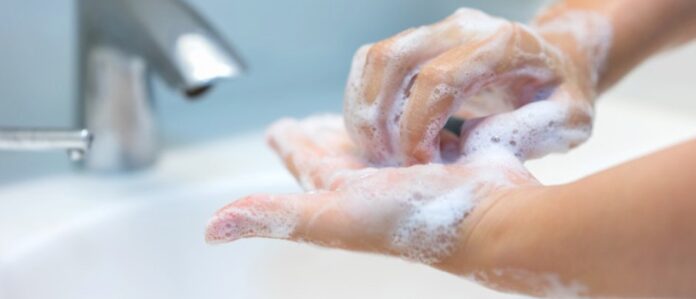Ahead of National Eczema Week, Pall Mall Medical’s expert dermatologist Dr Vikram Rajkomar is shedding light on a condition that affects up to 15 million Brits on a day-to-day basis and how it’s being worsened by the global pandemic.
Doctors at Pall Mall Medical, based in the North West, compared 2019 patient data with that from when the lockdown began and found a 30% increase in patients enquiring about dermatology issues.
Doctors believe that this rise could be down to the UK being encouraged to wash their hands more regularly and more thoroughly to stop the spread of Covid-19.
Though strict handwashing and sanitising guidelines are vital to protect Brits and the NHS, for those who suffer from eczema this can negatively impact their condition.
Dr Vikram Rajkomar has provided his best hacks for those whose skin is suffering due to our new normal, find out what they are here;
What is eczema?
Eczema is an inflammatory process where the skin becomes dry, cracked, itchy and sore. Though it’s possible for the condition to develop anywhere on the body, it’s most commonly found on the hands, elbows, knees, face and scalp. There are various causes of the condition, including genetic predisposition, irritant or allergic in nature.
What causes eczema?
There are many different types of eczema, each of which are caused by different factors. Atopic eczema, or atopic dermatitis, is the most common form of the condition and is caused by the skin being unable to retain moisture, resulting in dry and cracked skin. This type of eczema is genetic with multiple family members often suffering from the condition. Atopic eczema tends to appear in early childhood but sometimes doesn’t become apparent until later in life.
Contact dermatitis is another common form of eczema, however this is caused by the skin reacting adversely with a particular substance rather than being caused by genetics. The skin can either be reacting to an irritant, which damages the outer layer of the skin, or an allergen which interferes with the immune system, causing the skin’s reaction.
Can excessive handwashing worsen eczema?
“Though atopic eczema is the most common form of the condition, we’re currently seeing a rise in cases of contact dermatitis. The substances which most commonly cause contact dermatitis are soaps, detergents, solvents and water, meaning that excessive handwashing can easily trigger the condition. At this time, excessive handwashing and sanitising is a must to help tackle the spread of Covid-19 but Pall Mall Medical report an increase of 30% in dermatologist enquiries since the pandemic began.
How can eczema be treated?
There are a few different ways to treat eczema and your GP will help you to decide on the best method for you and your condition. The most common ways to treat the condition are to use emollients (moisturisers) on the skin to keep the affected area moisturised. A soap substitute should be used to wash hands and for showering or bathing.
Topical corticosteroids are also a great way to treat eczema as they can rapidly reduce the inflammation (redness) caused by eczema. Your GP will prescribe you the best type of topical corticosteroids for you depending on the severity of your eczema and the site affected.
Should these two treatments not help to alleviate your symptoms, your GP will work closely with you to decide on the best next steps to manage your eczema.
You can learn more about the diagnosis and treatment of eczema via the link.
How to navigate handwashing guidelines whilst protecting your hands?
Handwashing is a must in 2020 so those who suffer from eczema, particularly those with contact dermatitis, must know how to navigate handwashing guidelines to ensure that they’re protecting themselves and those around them by sanitising whilst also caring for their hands and skin. Below are my top five tips on how to stay clean and safe whilst putting your skin first.
- Carry your own hand sanitiser
By carrying your own hand sanitiser, you can avoid using those provided in shops, supermarkets, restaurants and other public places. By using your own personal sanitiser you’re aware of exactly what ingredients you’re putting onto your skin, and with some trial and error, you will hopefully be able to find a product which works for your skin type. I recommend using hand sanitisers which contain aloe vera due to its soothing properties. Hand sanitiser gel may be less irritating than the foam formulation.
- Don’t leave home without moisturiser
Helping your skin to retain its moisture is essential for combatting eczema so by keeping a small amount of your preferred moisturiser in your bag or pocket, you’re ensuring that your skin can be moisturised after every handwash. This can be achieved by decanting the moisturiser into a small container which is lighter to carry around and fits easily in your bag. Opt for a fragrance and alcohol-free product to reduce the risk of irritation.
Also, avoid products containing benzalkonium chloride which can be irritating. If you still find that your hands are too dry, try sleeping in cotton gloves to help your skin retain its natural moisture.
- When home, wash your hands once more
After multiple washes throughout the day, you may decide that when you arrive home that it’s time to give your skin a rest. However, as soon as you return home wash your hands one more time but using emollient. This will rid your skin of any harmful substances which are still lingering on your hands.
Emollient hand washes do not protect against Covid-19 but can be used once at home to help keep the hands moisturised. Be sure to pat your hands dry instead of vigorous rubbing and moisturise your hands intensively when you return home to counteract some of the damage done during the day.
- Ditch your wedding ring
Though to many of us, our rings carry a special meaning and we rarely remove them, they can cause your skin to become even more irritated. The substances which you’re having to apply to your skin can get trapped under your ring and as your ring naturally moves throughout the day, can cause worse irritation, so for now, it’s best to leave your rings at home.
- Wear disposable gloves
For those who simply cannot tolerate the harsh substances found in soaps and sanitisers on their skin, wearing disposable gloves is the best option. Most establishments won’t require you to sanitise your hands if you’re wearing disposable gloves, meaning that you can completely avoid contact with irritating substances. Just ensure that your gloves are frequently changed and disposed of safely to avoid the spread of germs.
If you’re struggling with eczema or any other skin condition, you can book a private GP appointment with Pall Mall Medical to discuss your concerns with no referral needed. You can book an appointment at Pall Mall Medical by calling 441613940355. Or for more information, please click here.







